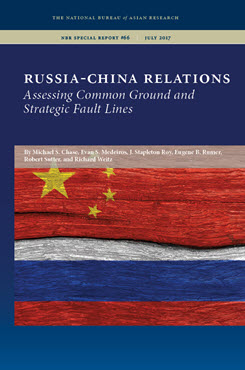Russia's China Policy
This Bear Hug Is Real
This essay considers Russian-Chinese relations from the perspective of Russia, challenges some of the widely held assumptions about Russian foreign policy and its goals, examines the key drivers of Russian policy toward China, and concludes with implications for U.S. interests.
EXECUTIVE SUMMARY
MAIN ARGUMENT
Russia’s relations with China have undergone a complete transformation in the past quarter century and have developed into a genuine strategic partnership. Although the Kremlin no doubt is aware of its junior partner status vis-à-vis Beijing, this relationship is truly without an alternative for Russia’s leaders. Russian foreign policy is controlled exclusively by a narrow circle of the country’s elite, whose chief preoccupation is with preserving domestic stability and the security of the ruling regime. The West’s insistence on domestic change in Russia makes it an incompatible partner for the Kremlin. Beijing, by contrast, does not confront Moscow with such demands and, moreover, partners with it to oppose the West’s pursuit of democratic change worldwide. These domestic considerations largely offset potential sources of friction in relations with China.
POLICY IMPLICATIONS
- Largely because of its one-sided relationship with China, Russia is unlikely to be a useful partner in addressing U.S. priorities in the Asia-Pacific, including in the South China Sea and on the Korean Peninsula.
- Given that Russian elites’ chief preoccupation is with domestic stability and the survival of the ruling regime, attempts to split Russia from China are unlikely to be productive. Russia’s opposition to the West’s promotion of democracy and human rights can be expected to override any concerns about overdependence on China.
- The U.S. must beware of unintended consequences of outreach to Russia. Any opening that the U.S. provides could enable Russia to engage in its own geopolitical maneuvering in the European theater, while doing little to weaken China.
Eugene B. Rumer is a Senior Fellow and Director of the Russia and Eurasia Program at the Carnegie Endowment for International Peace.


